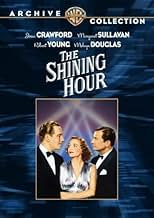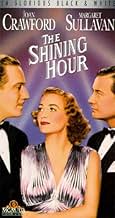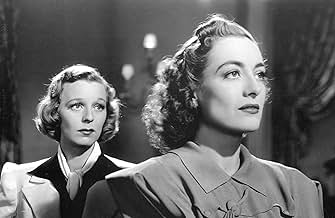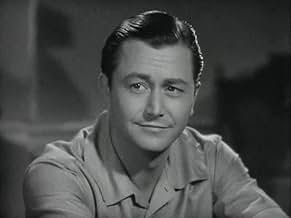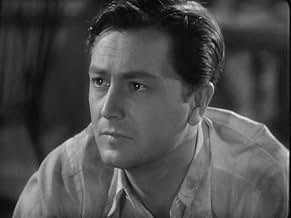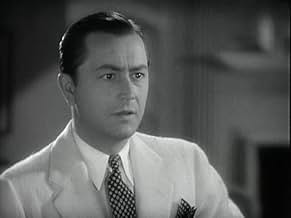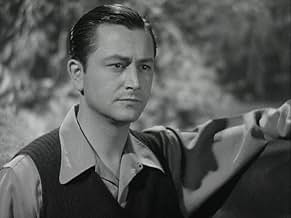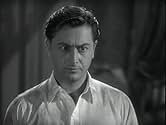IMDb RATING
6.4/10
1.4K
YOUR RATING
A nightclub dancer marries into high society and has to contend with her jealous sister-in-law.A nightclub dancer marries into high society and has to contend with her jealous sister-in-law.A nightclub dancer marries into high society and has to contend with her jealous sister-in-law.
- Awards
- 2 wins total
Granville Bates
- Second Man on Plane
- (uncredited)
Francis X. Bushman Jr.
- Club Sirocco Doorman
- (uncredited)
George Chandler
- Press Agent
- (uncredited)
Charles Coleman
- Henry's Butler
- (uncredited)
Jimmy Conlin
- Man Shaving on Plane
- (uncredited)
Roger Converse
- Hotel Clerk
- (uncredited)
Diane Cook
- Girl at Party
- (uncredited)
Featured reviews
A promising, although hardly unique premise wicked city woman (Joan Crawford) marries good ol' boy (this time a gentleman farmer, played by Melvyn Douglas) not for love, but because she's sick of her current lifestyle. Of course, plans go awry and this `intruder' into their pat little lives and old family ways unduly disrupts the farmer's whole family.
Unfortunately, The Shining Hour's structure is so episodic and choppy that none of the characters has time to be fully developed. This is a shame, as each of them appears quite interesting in the limited screen time allotted them. A longer running time and more character exploration would have benefitted the film greatly. As it is, every time a new tidbit of information is revealed that may be of interest to the viewer, some obvious plot point takes over and speeds things along toward the ludicrous ending. I was left shaking my head, groaning and shouting `NO!, NO!' at the screen more than once. Horrors.
CAST/PERFORMANCES: Joan Crawford gives a good performance here, and her beauty is almost overwhelming. Melodrama (which this film most definitely is) was her forte, and she excels as wrong-side-of-the-tracks dancer Olivia Reilly, looking to better her stature and improve her social standing through her association with new husband Harry Linden (Melvyn Douglas) and his well-established, none-too-poor family. Crawford comes off very believably in this role, and she's great in it.
Melvyn Douglas does an excellent job as Crawford's husband. I thought he was very adept at both the tender, quieter scenes as well as the angrier ones. As Harry Linden, he is a very sympathetic character who tries to keep everyone happy, and almost loses everything despite his efforts.
Robert Young's character is an enigma, and he plays the complex role of David Linden, Harry's brother, very well. David is a moody individual, and the viewer is never sure how he will act or react next. Young gives a thoughtful, yet strong performance. Having had quite a few roles like this in his younger days, it's unfortunate that he lapsed into mawkish television roles later in his career.
I can't relate at all to the character of Judy Linden, played by Margaret Sullavan. I like her performance, and think she does well with the words she is given to say. She cries well, too, which I always admire in an actor or actress, yet for me the role is too self-sacrificing, and her unbelievable character is the downfall of the entire scenario. Why, why, why???
Fay Bainter is usually better than she is here. I just didn't feel the menace that her character (Hannah Linden) was supposed to evoke, except for the party and fire scenes those were done very well. Hannah's character seems to be the forerunner of Luz Benedict (played by Mercedes McCambridge) in Giant. There are several similarities between the two. It's too bad that both performances are also somewhat lackluster.
GOOD POINTS, BAD POINTS: If you can ignore the implausibility of the outcome and the fact that some of the action is simply mind-numbingly hard to take, you might consider watching this film. My advice is to give The Shining Hour a chance, because aside from the goofy, terribly abrupt ending, it does have some elements to admire, including some thoughtful dialog and especially the humanity of the characters, which is surely the film's strongest point. However, this ruined potential makes it extra frustrating to watch, so keep all heavy objects out of your reach as you tune in.
Unfortunately, The Shining Hour's structure is so episodic and choppy that none of the characters has time to be fully developed. This is a shame, as each of them appears quite interesting in the limited screen time allotted them. A longer running time and more character exploration would have benefitted the film greatly. As it is, every time a new tidbit of information is revealed that may be of interest to the viewer, some obvious plot point takes over and speeds things along toward the ludicrous ending. I was left shaking my head, groaning and shouting `NO!, NO!' at the screen more than once. Horrors.
CAST/PERFORMANCES: Joan Crawford gives a good performance here, and her beauty is almost overwhelming. Melodrama (which this film most definitely is) was her forte, and she excels as wrong-side-of-the-tracks dancer Olivia Reilly, looking to better her stature and improve her social standing through her association with new husband Harry Linden (Melvyn Douglas) and his well-established, none-too-poor family. Crawford comes off very believably in this role, and she's great in it.
Melvyn Douglas does an excellent job as Crawford's husband. I thought he was very adept at both the tender, quieter scenes as well as the angrier ones. As Harry Linden, he is a very sympathetic character who tries to keep everyone happy, and almost loses everything despite his efforts.
Robert Young's character is an enigma, and he plays the complex role of David Linden, Harry's brother, very well. David is a moody individual, and the viewer is never sure how he will act or react next. Young gives a thoughtful, yet strong performance. Having had quite a few roles like this in his younger days, it's unfortunate that he lapsed into mawkish television roles later in his career.
I can't relate at all to the character of Judy Linden, played by Margaret Sullavan. I like her performance, and think she does well with the words she is given to say. She cries well, too, which I always admire in an actor or actress, yet for me the role is too self-sacrificing, and her unbelievable character is the downfall of the entire scenario. Why, why, why???
Fay Bainter is usually better than she is here. I just didn't feel the menace that her character (Hannah Linden) was supposed to evoke, except for the party and fire scenes those were done very well. Hannah's character seems to be the forerunner of Luz Benedict (played by Mercedes McCambridge) in Giant. There are several similarities between the two. It's too bad that both performances are also somewhat lackluster.
GOOD POINTS, BAD POINTS: If you can ignore the implausibility of the outcome and the fact that some of the action is simply mind-numbingly hard to take, you might consider watching this film. My advice is to give The Shining Hour a chance, because aside from the goofy, terribly abrupt ending, it does have some elements to admire, including some thoughtful dialog and especially the humanity of the characters, which is surely the film's strongest point. However, this ruined potential makes it extra frustrating to watch, so keep all heavy objects out of your reach as you tune in.
A perfect example of the Thalberg/Selnick/MGM high-style at its most polished. Flawlessly directed by the under-rated contract director Frank Borzage, the film features superb ensemble work from the entire stellar cast plus an unusually malicious turn by Fay Bainter who never quite showed her lady-like fangs like this before. Adapted from a well-made Broadway play of 1934, the sexual tension between the two unloving couples could never be realized as it might have been had there not been censorship so instead of a little explosive adultery and fiery hanky-panky, as the plot seems to suggest, we end up with a hot summer night instead with everyone complaining about the heat until the "burning" resolution --but not the one you might think. (Had Tennessee Williams been around in those days we might have had an entirely different ending.) Yes, it is definitely a soap opera but MGM always gave us the best soap money could buy!
The performances in this film are adequate, with standout performances by Margaret Sullivan and Fay Bainter. It is the writing that fell short.
The romance and sexual tension are never fleshed out. In fact, most of it is unbelievable. The film is still entertaining but only because of star power and the snide remarks Bainter flings at Crawford.
Had this not been made during the production code they might have been able to explore the seamier side of it. The way it is handled you just don't care about any of the relationships in the film.
Hattie McDaniel is always a delight to see and always leaves you wanting more.
The romance and sexual tension are never fleshed out. In fact, most of it is unbelievable. The film is still entertaining but only because of star power and the snide remarks Bainter flings at Crawford.
Had this not been made during the production code they might have been able to explore the seamier side of it. The way it is handled you just don't care about any of the relationships in the film.
Hattie McDaniel is always a delight to see and always leaves you wanting more.
Everybody in this film talks about their feelings (or lack of feelings) in surprisingly articulate ways. The dialogue crackles and the actors are all in top form. Crawford and Sullavan have the best moments, but Douglas, Young and Bainter all create believable characters, too. Not a great film, but an interesting sexual, social and moral snapshot of the era. A must for admirers of Borzage and/or Margaret Sullavan.
Joan Crawford disrupts a family in "The Shining Hour," a 1938 film also starring Melvyn Douglas, Margaret Sullavan, Robert Young, and Fay Bainter.
Crawford is Olivia Reilly, a New York City dancer who works in a nightclub with a partner doing an act sort of modeled on Astaire and Rogers though it's clearly down several levels.
Melvyn Douglas is Henry Linden, a gentleman farmer who wants to take her away from all this to Wisconsin, and sick of her present life, she marries him. Arriving on the farm, she finds herself hated by Henry's sister, Hannah (Bainter), lusted after by Henry's brother David (Young) and loved and envied by David's wife Judy (Sullavan).
Before long, David is making overt passes, Henry has figured out David is in love with his wife, and in spite of herself, Judy begins to suspect the same thing.
This film is a little overdone, as it seems like the tension in the house never lets up. David always looks miserable, Judy always looks nervous, Olivia is always trying to be nice except when she's trading barbs with Hannah, and Hannah is nasty.
How any of them stood one another for more than ten minutes is a miracle. We are never allowed to see any happiness.
Also, the entire end of the film is a mess -- Judy takes a ridiculous step to make everything right, but it all goes in the opposite direction.
The most absurd part of the whole film, without giving anything away, is that one of the characters ends up wearing bandages - covering their nose and mouth with only the eyes showing. Now, how is anyone supposed to breathe like that? How did the actor breathe, in fact?
Joan Crawford looks beautiful and is very good in her role as a city slicker who wants to love her husband and environment but is finding it difficult.
Tall, elegant Melvyn Douglas, who thirty years later would emerge as one of the truly great actors in cinema, does a wonderful job as the even-tempered one of the family. For so many years, he played the family friend, the family lawyer, the other man - how, with all that magnificent talent, did he ever stand it?
Robert Young is fine as David, though Margaret Sullavan is so nice and sweet and so much in love with him that he's somewhat unlikable for coming on to Olivia. As the vicious Hannah, Fay Bainter is effective, though I'd have thrown her out of the house.
All in all, it's just okay.
Crawford is Olivia Reilly, a New York City dancer who works in a nightclub with a partner doing an act sort of modeled on Astaire and Rogers though it's clearly down several levels.
Melvyn Douglas is Henry Linden, a gentleman farmer who wants to take her away from all this to Wisconsin, and sick of her present life, she marries him. Arriving on the farm, she finds herself hated by Henry's sister, Hannah (Bainter), lusted after by Henry's brother David (Young) and loved and envied by David's wife Judy (Sullavan).
Before long, David is making overt passes, Henry has figured out David is in love with his wife, and in spite of herself, Judy begins to suspect the same thing.
This film is a little overdone, as it seems like the tension in the house never lets up. David always looks miserable, Judy always looks nervous, Olivia is always trying to be nice except when she's trading barbs with Hannah, and Hannah is nasty.
How any of them stood one another for more than ten minutes is a miracle. We are never allowed to see any happiness.
Also, the entire end of the film is a mess -- Judy takes a ridiculous step to make everything right, but it all goes in the opposite direction.
The most absurd part of the whole film, without giving anything away, is that one of the characters ends up wearing bandages - covering their nose and mouth with only the eyes showing. Now, how is anyone supposed to breathe like that? How did the actor breathe, in fact?
Joan Crawford looks beautiful and is very good in her role as a city slicker who wants to love her husband and environment but is finding it difficult.
Tall, elegant Melvyn Douglas, who thirty years later would emerge as one of the truly great actors in cinema, does a wonderful job as the even-tempered one of the family. For so many years, he played the family friend, the family lawyer, the other man - how, with all that magnificent talent, did he ever stand it?
Robert Young is fine as David, though Margaret Sullavan is so nice and sweet and so much in love with him that he's somewhat unlikable for coming on to Olivia. As the vicious Hannah, Fay Bainter is effective, though I'd have thrown her out of the house.
All in all, it's just okay.
Did you know
- TriviaJoan Crawford specifically asked for Margaret Sullavan to play the role of Judy, despite Louis B. Mayer's warning that the accomplished stage actress could steal the picture from her. Joan replied "I'd rather be a supporting player in a good picture than the star of a bad one."
- Quotes
Judy Linden: Hannah's quoting the bible again. One of these days we're going to put her in all the hotel rooms.
- ConnectionsFeatured in Joan Crawford: The Ultimate Movie Star (2002)
- SoundtracksWaltz in C sharp minor, Op.64, No. 2
(1846-47) (uncredited)
Written by Frédéric Chopin
Played at the nightclub for specialty dance by Joan Crawford and Tony De Marco
Reprised by Robert Young on piano; also played by him in a jazzy version
Incorporated as part of the score
- How long is The Shining Hour?Powered by Alexa
Details
Box office
- Budget
- $1,068,000 (estimated)
- Runtime1 hour 16 minutes
- Color
- Aspect ratio
- 1.37 : 1
Contribute to this page
Suggest an edit or add missing content



